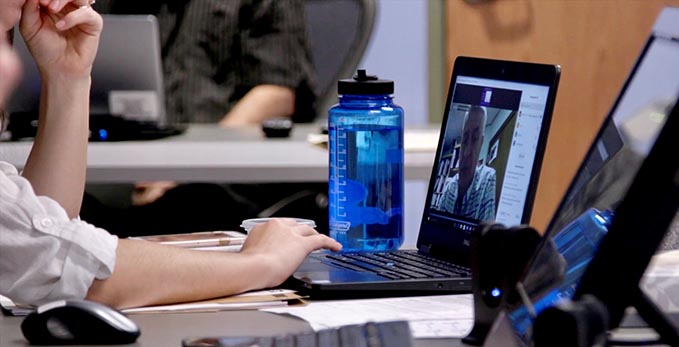When the UNM Department of Psychiatry & Behavioral Sciences launched a one-year postdoctoral fellowship in forensic psychology in 2018, 15 to 17 people would meet weekly for a didactic presentation on a variety of subjects.
Then came COVID. The UNM campus shut down in March 2020 and instruction went online.
“We had to move to Zoom,” says clinical professor Jeff Younggren, PhD, the project’s co-director. “We had the idea that maybe we ought to just make this available to interested psychologists and lawyers who could get their continuing education credits.”
Two years later, the online offering, dubbed the Law and Mental Health Lecture Series, is on its way to becoming a global phenomenon. The weekly sessions with top names in the field now draw 600 to 700 people from throughout the U.S., Canada, Europe and Asia.
“It just morphed into this big thing,” Younggren says. “The topics are current and the presenters are national-level experts. The list reads like a who’s who of forensic mental health, both in psychology and psychiatry.”
Participants, including psychiatrists, psychologists, lawyers and others, receive continuing education credits for attending. Notices of upcoming presentations are posted on a variety of listservs and sent to a mailing list of previous attendees.
The weekly topics have included presentations on antisocial personality disorder, the impact of alcohol and substance abuse on testimony and memory, assessment techniques, and the differences between strong belief and delusional disorders, among other topics, he says.
Forensic psychologists are often called upon by the court system to evaluate criminal defendants’ competence to stand trial and testify at trial regarding the effects of mental illness, drugs, alcohol and post-traumatic stress, Younggren says.
The UNM fellowship program has grown to include two postdoctoral fellows, a full-time director and a second forensic psychologist. During their training, the fellows conduct mental health evaluations under supervision. They also participate in mock courtroom training with lawyers from the community volunteering their time, Younggren says.
“By the time they finish we want them to have taken their national exams and pretty much have completed their licensure,” he says. “We are trying to produce forensic people who stay here and deliver services to the court system,” he says.
The weekly online seminars “really blasted off like a Saturn rocket,” Younggren adds. “This thing has really put New Mexico on the map as a center of forensic excellence. We’ve called in all of our debts from all of our friends to come in and present.”
